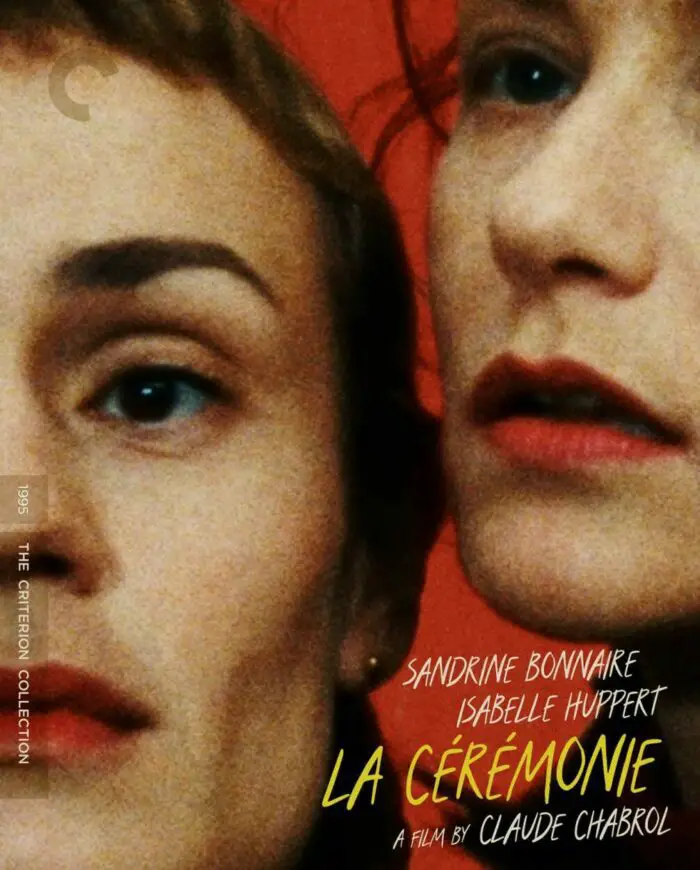Not long after Bong Joon Ho’s deliciously wicked class-conflict comedy-drama Parasite (2019) won the Palm D’Or, he was asked which films influenced his the most. Among them were The Housemaid (1960) by his mentor Kim Ki Young, Joseph Losey’s The Servant (1963), Alfred Hitchcock’s Psycho (1960), and two films by French director Claude Chabrol: Que la bête meure/The Beast Must Die (1969) and La Cérémonie (1995). The latter is one of those films well known but too rarely seen here in the U.S., long overdue for a good physical media release and now arriving on Blu-ray and DVD via The Criterion Collection in a pristine new 4K remaster replete with special features that delicately trace Chabrol’s methodical study of class conflict.
For those unfortunates unfamiliar with La Cérémonie, let me just say this: a certain big-box bookseller is up to its biannual 50% off Criterion Collection shenanigans this November, and among your prize picks this year should be Spine #1199. If you are any fan of criterion, of Chabrol, of Parasite, of crime films specifically or the cinema generally, La Cérémonie should be on your watchlist. Even if you have an earlier physical media disc or tape (I don’t think it has been available on home video in a Region 1 North American release except DVD), this stunning new remaster is well worth any upgrade for collectors.
La Cérémonie introduces two servant-strangers into the life of a well-to-do French family’s countryside home. Sandrine Bonnaire plays Sophie, a maid hired by Jacqueline Bisset’s Catherine, to assist with the cleaning and cooking for her husband and their two children, each from a prior marriage. César Award-winning Isabelle Huppert plays Jeanne, a postal worker who befriends Sophie, the two of them forming an alliance that teeters on the verge of romance but veers into a simmering class resentment against Catherine’s family and all that it represents.
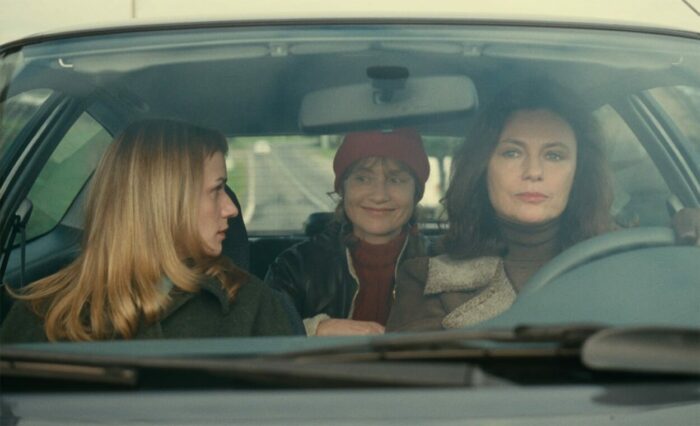
Catherine’s family, the Lelièvres, seem, on the surface, sweet folks. The couple are in love, the children respect their parents, and they treat Sophie with dignity. They are not (not unlike the Park family in Parasite) villainous in any traditional way; they are, though, well-to-do in a way that affords them their well-meaning, and in one which engenders resentment from those significantly less so.
Sophie and Jeanne, meanwhile, do not seem to have much in common at first, other than their shared social standing or lack thereof. Sophie is reserved and guarded, hiding her illiteracy; Jeanne is brash and outspoken, prone to emotion and outburst. But the two have more than resentment of their employers in common; each of them shares a violence that haunts their past and threatens to explode once again. Chabrol directs with a veteran’s command of technique and slowly mounts the pair’s simmering angst in a frightening explosion of violence.
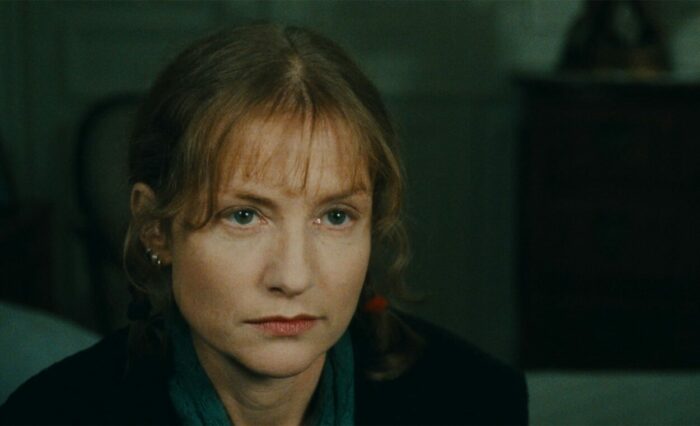
La Cérémonie is technically an adaptation of British writer Ruth Rendell’s 1977 novel A Judgment in Stone, but its antecedents trace back through the 1947 Jean Genet play The Maids and the infamously grisly true-life murder case of sisters Christine and Lea Papin, two French maids who brutally murdered their employer’s wife and daughter in Le Mans in 1933; Chabrol and co-writer Caroline Eliacheff mine these sources for the grist of the narrative but flesh out its plot with a richly melodramatic mise en scène, using domestic props and set dressings like televisions, hallways, and staircases in the best Sirkian tradition to separate the domestics from their employers.
All of the simmering resentment boils over as the Lelièvres settle in to enjoy an evening of televised opera, oblivious to the class conflict they’ve fostered through nothing more than their very existence. Chabrol, not one for the hyperbole of melodrama, uses its trappings, including the blaring score of Don Giovanni, but grounds the action in a fatalistic realism. It’s first-rate cinema pitting the proletariat against the bourgeoisie when the sordid secrets of the lower class come to light.
Criterion presents La Cérémonie in a new 4K digital restoration scanned from the original 35mm camera negtive, approved by actor Thomas Chabrol[ck] and composer Matthieu Chabrol[ck], sons of director Claude Chabrol, with 2.0 surround DTS-HD Master Audio soundtrack, in its original 1.66:1 aspect ratio.
It looks nothing short of spectacular.
As per usual, Criterion does not skimp on the menu of special features, serving up here a feast of content that speaks to the rich interplay of technique and meaning in La Cérémonie.
Selected-scene commentary featuring director Claude Chabrol: The renowned Nouvelle Vague director made the first of his 57 feature films in 1958; La Cérémonie, in 1995, was his 49th. He adopts something of a self-effacing persona in discussing his work but does not shy from technical detail in reconstructing the careful mise-en-scene of his work and the performances of his actors. The film does not include a full commentary track but instead collates Chabrol commenting on five scenes, including a Lelièvre family dinner, Sophie and Jeanne’s shared meal, Sophie’s blackmail of Melinda, the Don Giovanni televised opera, and the film’s fitful conclusion. Chabrol’s commentary is excellent throughout, full of charming anecdotes and technical details of the director’s use of light, props, set dressing, and sound. One could wish only for a second full commentary track from a scholar alongside Chabrol’s pithy, if limited, commentary. (Note that this feature does not display the film scenes themselves in the lovely 4K remaster but in a far less satisfying resolution.) 29 minutes, in French with English subtitles.
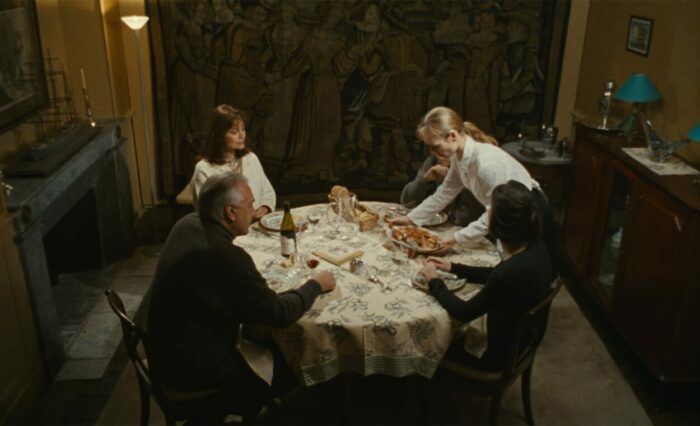
Introduction by filmmaker Bong Joon-Ho: The Parasite director is a perfect choice to introduce a 1990s film about servants who infiltrate and upend the bourgeois house of an upper-class family. Bong’s picture was a surprise Academy Award winner, but the director clearly holds La Cérémonie in the highest regard. Bong seems fascinated by the “flatness” of Chabrol’s technique, especially in comparison with another master of suspense’s, Alfred Hitchcock’s, and speaks directly to the influence of La Cérémonie on Parasite. 13 minutes, in Korean, with English subtitles.
The Making of La Cérémonie: This mini-documentary feature Chabrol and his three lead actors—Huppert, and Bisset—speaking to the film’s adaptation of the Rendell source novel and to its production techniques. Huppert’s comment that Chabrol’s technique resembles “an entomologist watching bugs struggle” is not only comic but insightful. Bisset, meanwhile, seems unfamiliar with the basic tenets and terminology of the Marxist theory that informs the script. Like Huppert and Bonnaire, she speaks primarily in defense of her character. The program also includes excellent behind-the-scenes footage of the film’s production, with most interviews conducted on set. 19 minutes, in French, with English subtitles.
Crossed Portraits: This program, aired originally on French television in December, 1998, focuses on the collaboration between Huppert and Chabrol, who teamed together on seven films beginning with 1978’s Violette nozière. That first role—that of a shy schoolgirl leading a double life as a prostitute—earned Huppert the Best Actress prize at Cannes and began a long and rich collaboration with Chabrol that continued well into the 21st century. The program also includes clips from Huppert’s performances in Chabrol’s Une affaire de femmes (1988), Madame Bovary (1991), and Rien ne va plus (1997). Huppert, apparently, enjoys pulling the director’s chains, even as she clearly adores him, having dedicating her La Cérémonie César award to him. 22 minutes, in French with English subtitles.
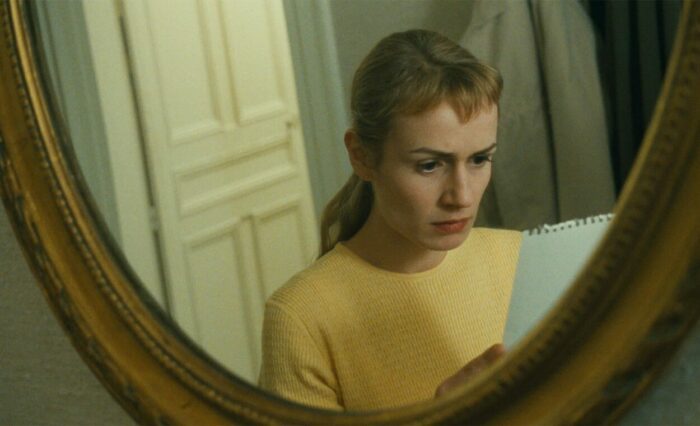
Caroline Eliacheff: The La Cérémonie co-writer is interviewed in a short feature from 2000, speaking to the film’s diverse source origins—not only the Ruth Rendell novel but the case of the Papin sisters, the two young French maids who murdered their employers in 1933 and whose case became the focus of studies by Lacan, Sartre, and de Beauvoir and engendered a “crisis of meaning” among psychoanalysts and Marxist theorists. Eliacheff speaks to “pinching” elements—like Sophie’s and Jeanne’s television-watching—as her approach: “You need a certain amount of ingredients. Like a mayonnaise.” 9 minutes, in French with English subtitles.
Offscreen Sound in La Cérémonie: In the Criterion Channel series Observations on Film Art episode no. 8, Professor Jeff Smith of the University of Wisconsin-Madison breaks down how Chabrol uses offscreen sound to mask onscreen sound, create paranoiac moods, establish sonic motifs, and even determine subjectivity through the use of ambient sounds, as is the case in the first scene of La Cérémonie. The segment also examines the clever use of Melinda’s boombox—planted in an early scene like Chekhov’s gun—to betray the killers in a “delicious” final irony. 9 minutes, in English.
Domestic Disturbances: Sarah Weinman, Crime & Mystery columnist for the New York Times Book Review and author of The Real Lolita and Scoundrel, examines the lower-class, unmarried and unloved characters of Jeanne and Sophie in the context of Chabrol’s career in ways none of the other special features address. This essay features in a 12-page booklet alongside the film’s cast, crew, and restoration credits.
Also included is the film’s original one-minute French trailer from 1995, set to the score of Don Giovanni.
La Cérémonie, Criterion Collection Spine #1999, is available directly from Criterion.com and other retailers Nov. 21, 2023. The Blu-ray edition retails for $39.95; the DVD $29.95.

